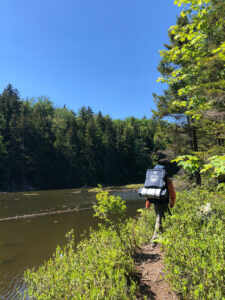 Engaging in a wilderness or residential therapy placement is a big commitment for families, especially since it usually entails withdrawing from school, and letting go of expectations one may hold surrounding traditional academics. As a society, we are accustomed to a developmental trajectory that emphasizes academic success as the central point of focus, with emotional and social development lurking in the periphery. It can be stressful, anxiety provoking and grief inducing when parents are likely left with no choice but to shift away from an idealized adolescence that has been cultivated over time. Parents may encounter judgment from friends, family, or people who might not otherwise understand the struggles that families are going through. Once a family prioritizes emotional wellbeing and diverges from “the norm” it is important to honor and process the feelings that emerge throughout the therapeutic experience.
Engaging in a wilderness or residential therapy placement is a big commitment for families, especially since it usually entails withdrawing from school, and letting go of expectations one may hold surrounding traditional academics. As a society, we are accustomed to a developmental trajectory that emphasizes academic success as the central point of focus, with emotional and social development lurking in the periphery. It can be stressful, anxiety provoking and grief inducing when parents are likely left with no choice but to shift away from an idealized adolescence that has been cultivated over time. Parents may encounter judgment from friends, family, or people who might not otherwise understand the struggles that families are going through. Once a family prioritizes emotional wellbeing and diverges from “the norm” it is important to honor and process the feelings that emerge throughout the therapeutic experience.
Tending to a child or young adult’s emotional needs over academics creates a foundation so they can be successful in school in the future. There are many things that might get in the way of young people finding consistency and balance with expectations that might be put upon them. Their struggles could be related to anxiety, depression, effectively dealing with feelings of overwhelm, learning needs or processing difficulties, shame, self-doubt, and/or challenges with asking for help. At True North, students learn how to address their underlying needs and emotions related to these challenges and difficulties experientially. As students gain understanding of how they learn and develop methods for effectively getting their needs met in these domains, we can support their re-engagement in a school setting post True North and well into the future. Furthermore, True North is a licensed independent school where students may employ increased self awareness and tools for success, receive academic credit for their work, while receiving support and learning coping strategies for feelings that emerge in the process.
 Practical considerations and resources are also on the forefront of most family’s minds. How will they make up the credits? How are they going to fit in socially? What school will accept my child mid-semester or mid-year? These are all valid questions that are necessary to consider in the process of assessing what a student needs to be successful in school. However, it is worth noting that identifying those needs and assessing what interventions will be beneficial are also of paramount importance. From that point, it will be necessary to align with the right people and professionals who can meet the identified needs that are gleaned throughout the therapeutic process.
Practical considerations and resources are also on the forefront of most family’s minds. How will they make up the credits? How are they going to fit in socially? What school will accept my child mid-semester or mid-year? These are all valid questions that are necessary to consider in the process of assessing what a student needs to be successful in school. However, it is worth noting that identifying those needs and assessing what interventions will be beneficial are also of paramount importance. From that point, it will be necessary to align with the right people and professionals who can meet the identified needs that are gleaned throughout the therapeutic process.
Fortunately there are people, programs and schools out there that understand the challenges and difficulties that we are addressing, and these people and places are particularly well attuned to meeting the needs of non-traditional learners. The adage of, “it takes a village to raise a child” rings true here. Rest assured, there are many schools, consultants, and mental health professionals who understand these dynamics and concerns. When you align with the right people—people who take time to patiently understand the needs of non-traditional learners—the path to balance, consistency, wellness and healthy change is attainable. The path may not look the way you envisioned it when your child was young, and that is okay. With increased understanding and proper support, they will be better able to chart a path towards wonderfully fulfilling lives and you will get to bear witness as the unknown unfolds.


